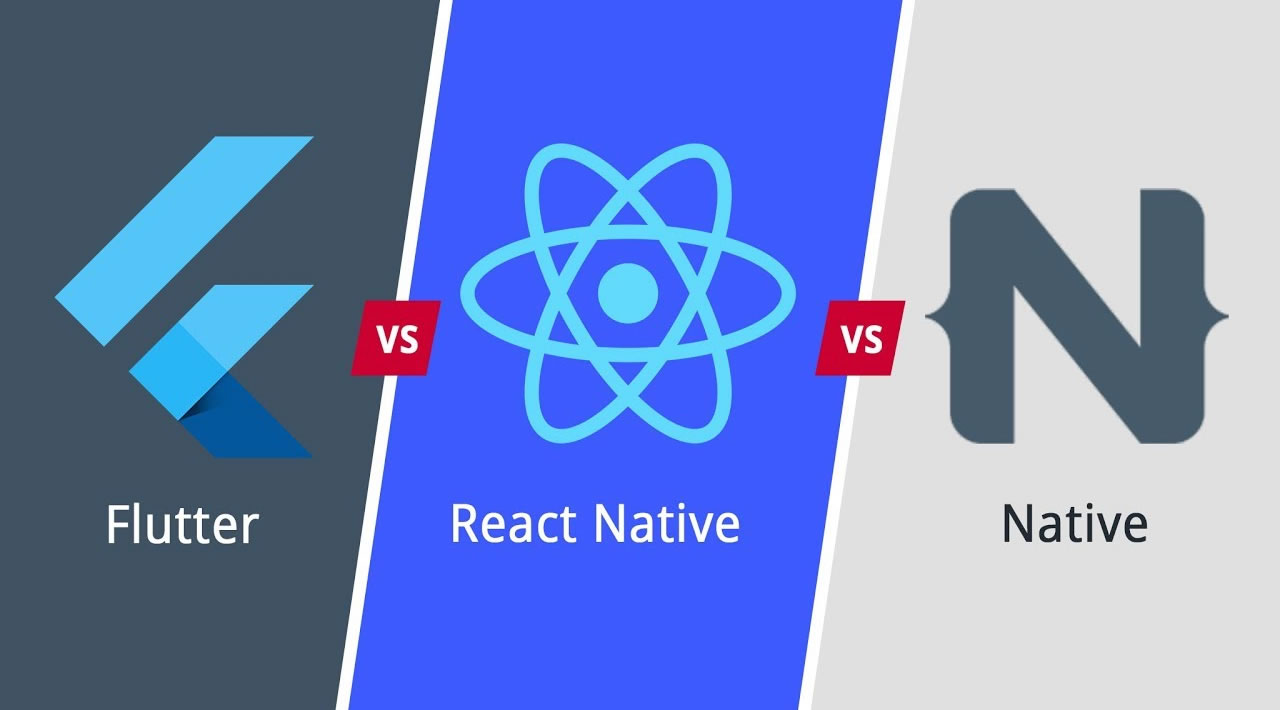React Native vs. Flutter vs. Native: What to Choose in 2020?
Creating mobile applications has always been a fundamental pillar of the tech industry but having multiple platforms for which different apps need to be developed has been an issue for some time. Apart from having to maintain two teams, one for Android and one for iOS, there’s always a gap between the applications developed as they are made by totally different teams. That’s what gave birth to the idea of creating cross-platform mobile applications.
There are many types and solutions but the most popular one right now is by creating compiled apps that give the closest performance to that of the real native applications. The most popular solutions to build mobile apps are native or cross-platform approaches using React Native or Flutter. While native development is positioned as AAA technical solution, it has some disadvantages that create market space for cross-platform apps to come in. In general, native development requires more effort from the development team to accomplish the project but it gives full control over tricky technical stuff under the hood. On the other hand, if you choose cross-platform, it can significantly speed up the development process due to a common code base, make project support easier and reduce expenses for development.
One more advantage of native over cross-platform development is performance. In the technical world, you can encounter “cross-platform apps are slow” stereotypes. We decided to test if it’s true and to what extend cross-platform apps are slower than native.
There are different types of performance, some of them are:
- Interacting with phone API (accessing photos, file system, getting GPS location and so on).
- Rendering speed (animation smoothness, frames per second while UI is changed or some UI effects that take place in time).
- Business logic (the speed of mathematical calculations and memory manipulations. This type of performance is most important for the apps with complex business logic).
In this article, we share the results of performance tests showing mathematical calculations of number Pi implemented in native and cross-platform approaches.
Flutter
Flutter is a reactive cross-platform mobile development framework that uses the Dart language. Dart and Flutter have been created by Google who’s using the framework for some of its biggest applications and is constantly pushing the framework towards being the ultimate solution for creating cross-platform apps. Its initial alpha release was back in May 2017 so it’s much younger than React Native.
React Native
React Native is perhaps the renowned world champion of cross-platform mobile development. React Native is a javascript framework built upon the React library, both created by Facebook, and it allows you to ship IOS and Android apps with a single code base. It’s used primarily by Facebook, Instagram, Airbnb, and many others. React Native started out as an internal hackathon project at Facebook back in 2013, and in 2015 it was released to the public.
CPU-intensive test (Gauss–Legendre algorithm) for iOS
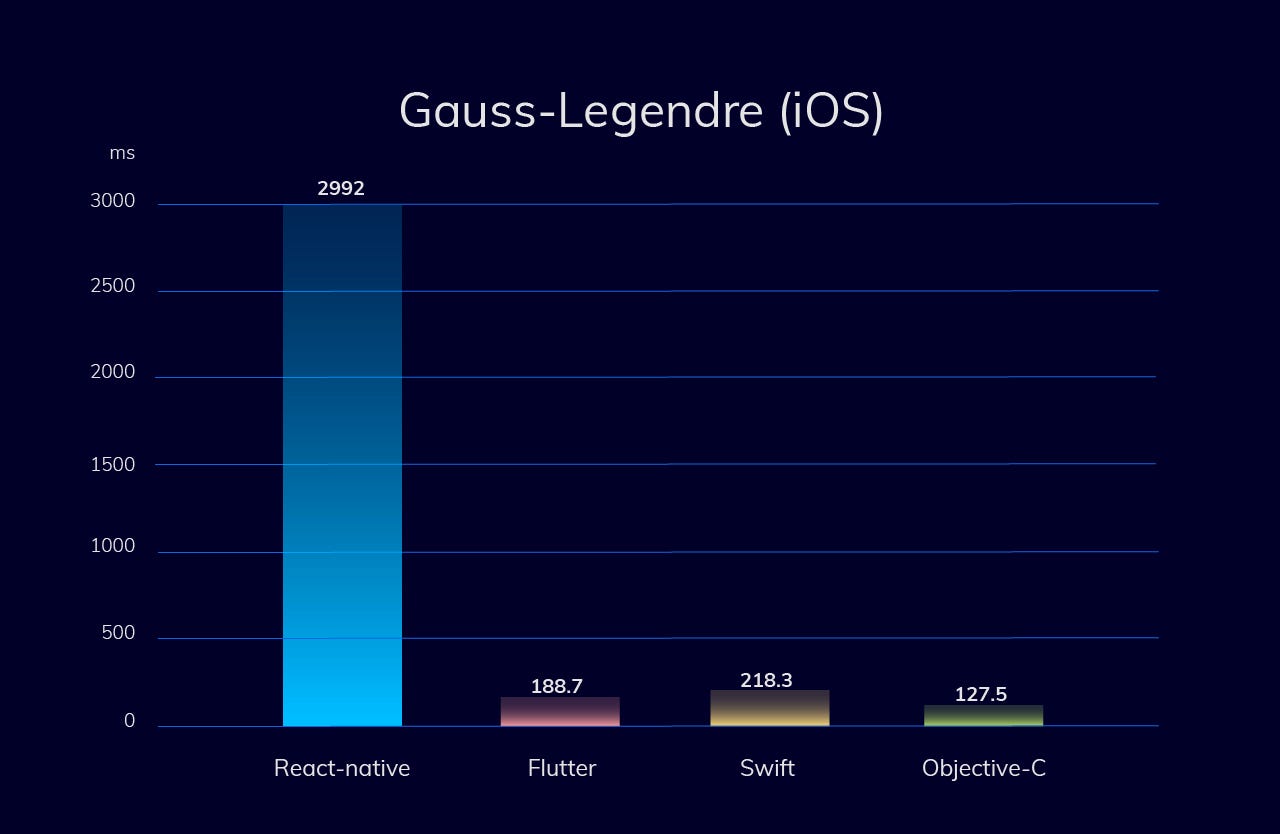
iOS
- Objective-C is the best programming language for iOS development. Swift is 1.7 times slower compared to Objective C.
- Surprise: Flutter is a bit faster than Swift (on 15%).
- React Native is 20 times slower than Objective C.
CPU-intensive test (Borwein algorithm) for iOS
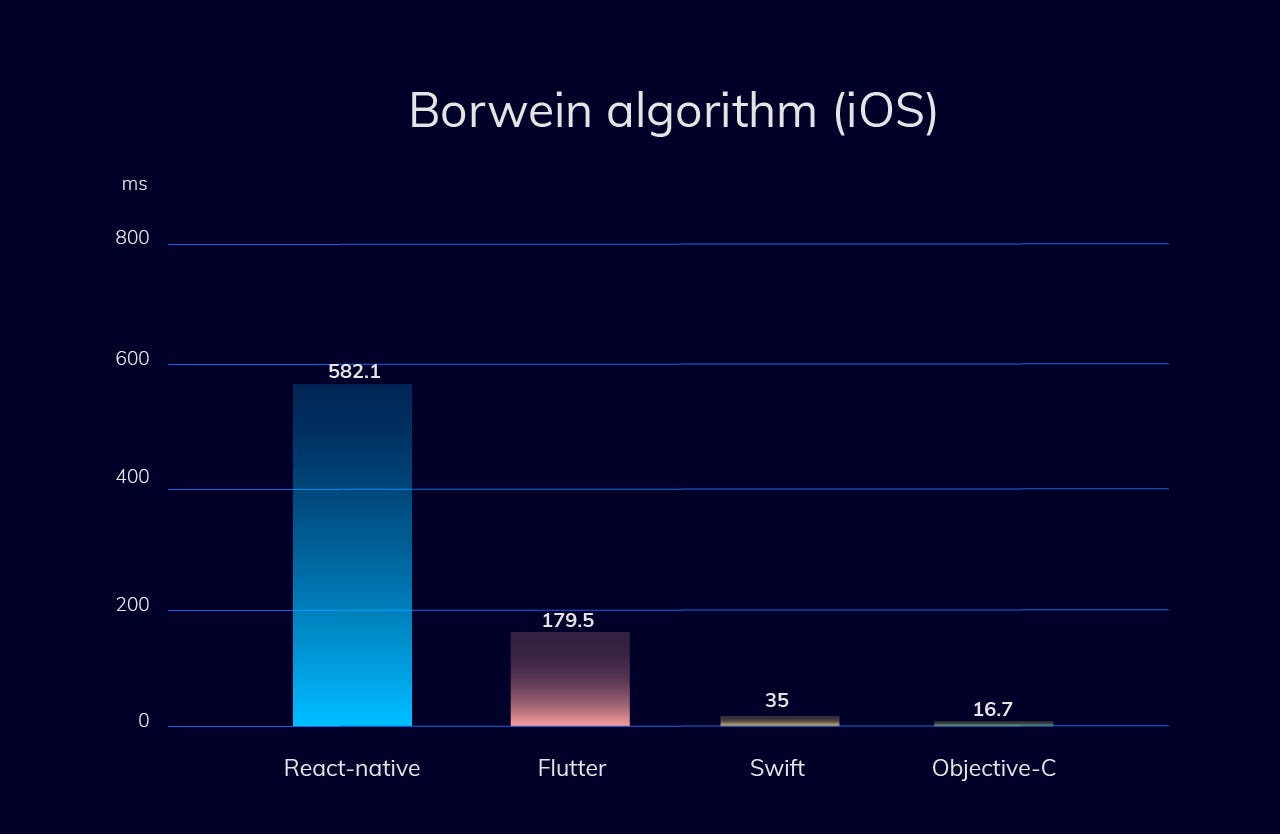
iOS
- Objective C is the best option for iOS app development. Swift is 1.9 times slower compared to Objective-C.
- Flutter is 5 times slower than Swift.
- React Native version is more than 15 times slower than the Swift version.
CPU-intensive test (Gauss–Legendre algorithm) for Android
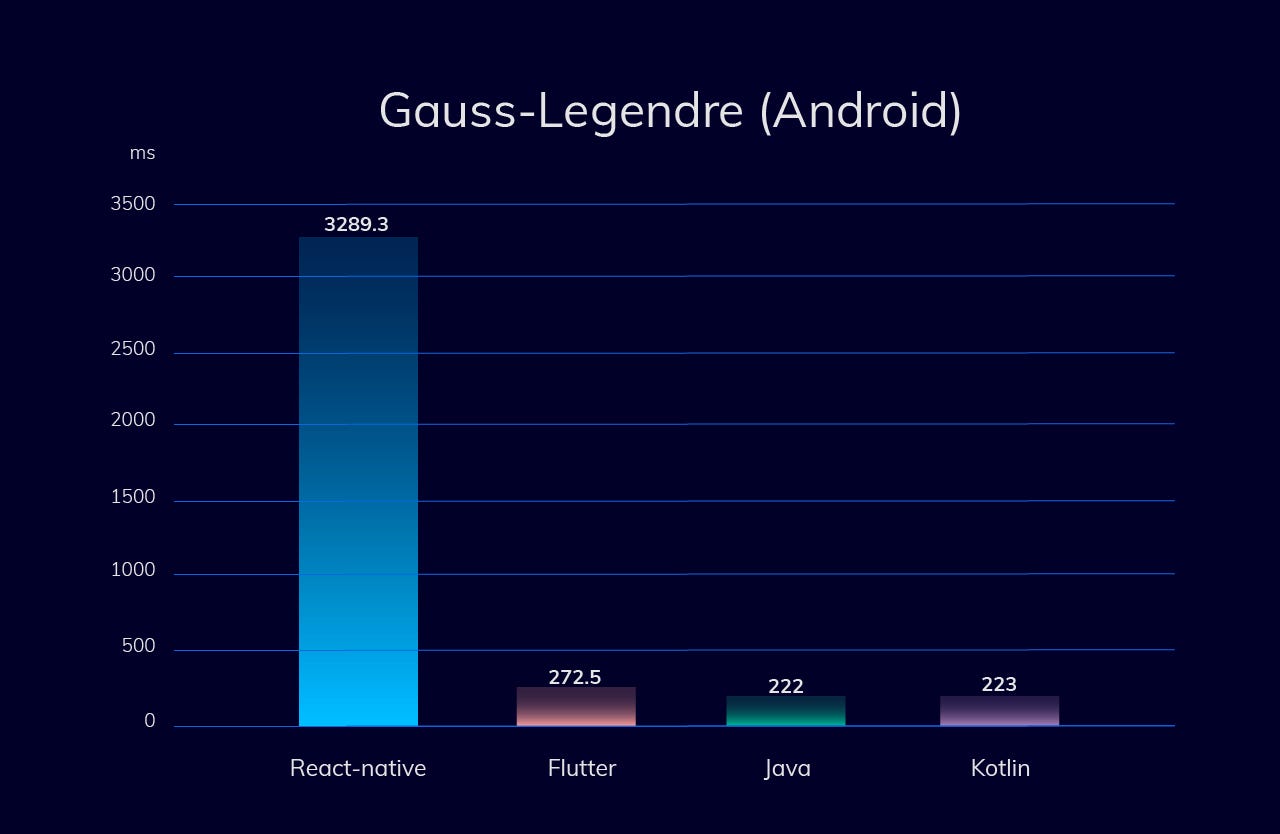
Android
- Java and Kotlin have similar performance indications and are the best options for Android development.
- Flutter is approximately 20% slower than native.
- React Native is around 15 times slower than native.
CPU-intensive test (Borwein algorithm) for Android
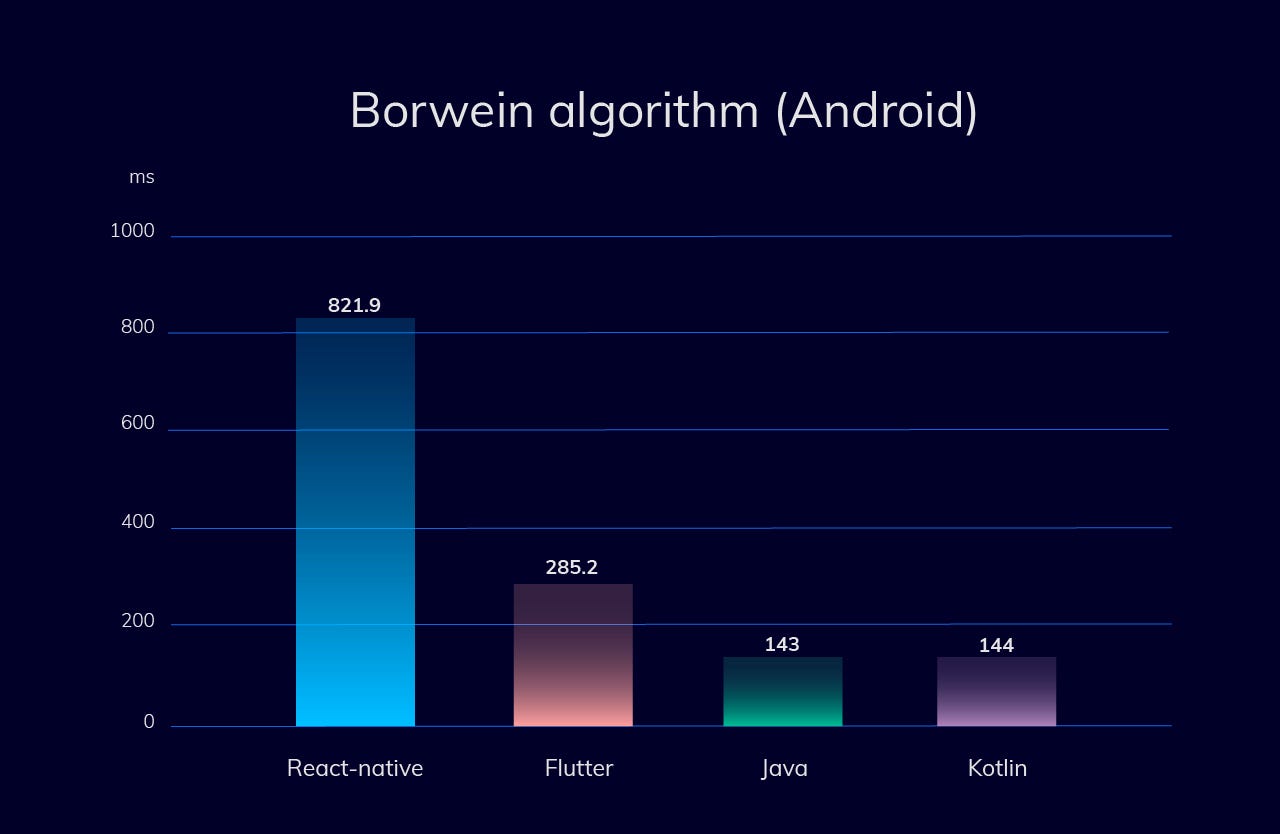
Android
- Java and Kotlin have similar performance indications and are the best options for Android development.
- Native is 2 times faster then Flutter.
- React native is around 6 times slower than native.
Technical details:
- All tests have been done on real physical devices (iPhone 6s IOS 13.2.3 and Xiaomi Redmi Note 5 running under Android 9.0);
- We measured performance on release builds. In some cases, debug builds can be significantly slower than the release builds.
- All tests were run several times and the average result was calculated.
- Gauss–Legendre & Borwein algorithms of calculating Pi numbers were used. The Pi number has been calculated 100 times with 10 million digits precision.
- Gauss–Legendre is a more memory-intensive algorithm in comparison with Borwein, but Borwein is more CPU-intensive.
- Source code
Key takeaways
- In summary, not all cross-platform apps are slow. What’s more than that, Flutter apps have higher performance than Swift apps.
- Objective C and Flutter will be a wise choice if you want to develop a super-fast iOS app.
- For the apps with high load calculations Flutter is a good option for both, Android and iOS app development.
#flutter #reactnative #native #reactjs #mobileapps
